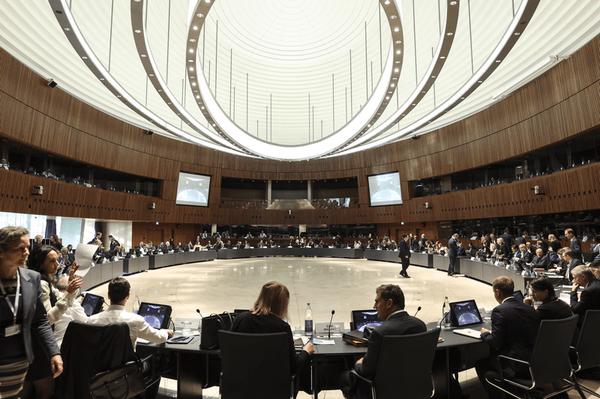EU split over fossil fuel phaseout at COP28 – Reuters
The EU is divided over the phaseout of fossil fuels as the bloc's Environmental Council convenes in Luxembourg to finalise its COP28 position.
 PHOTO: EU Environmental Council meeting underway in Luxembourg. Twitter of @mitecogob
PHOTO: EU Environmental Council meeting underway in Luxembourg. Twitter of @mitecogob
The EU’s climate ministers have gathered in Luxembourg today to finalise the group's position in the upcoming COP28 climate summit taking place in UAE next month.
“Europe debates its positions before COP28: Maintain the target of 1.5°C and reach or exceed the -55% emissions target in 2030,” explained Spanish vice president and climate minister, Teresa Ribera in a social media post. Ribera is presiding over the Environmental Council meeting today.
Earlier reports suggested that EU member states were likely to push for a complete fossil fuel phaseout by at least 2050. However, a recent Reuters report indicates the EU is unable to reach a consensus on whether the use of all fossil fuels needs to be entirely phased out.
Reuters reported citing EU diplomats that 10 EU member states including Denmark, France, Germany, Ireland, the Netherlands and Slovenia support an end to fossil fuel use by 2050.
The other 10, including the Czech Republic, Hungary, Italy, Malta, Poland and Slovakia, are on the other side of the fence, Reuters noted. Specifically, these countries want to phase out only "unabated" fossil fuels, which means burning fossil fuels without carbon capture.
It would allow countries to continue burning coal, gas and oil if they use carbon capture storage and utilisation (CCUS) technology to capture emissions.
Additionally, nations like France and the Netherlands favour the removal of fossil fuel subsidies by 2025. In contrast, countries that rely heavily on fossil fuels like Poland are hesitant about setting a deadline, EU diplomats told Reuters.
Maritime sector backs CCS
CCUS is gaining traction in the shipping industry, as industry experts tout it as a valuable tool for reducing emissions in conjunction with the use of cleaner fuels.
A recent report from DNV highlighted onboard carbon capture and storage (OCSS) as an option "beyond fuels" to combat maritime emissions. CO2 captured from vessels' emissions can be permanently stored deep underground or used to produce marine fuels like e-methanol, with zero-emission potential.
DNV underscored that OCSS would allow ships to use fossil-based fuels while significantly reducing emissions. This would ease the burden of producing green and blue fuels, like e-methanol or blue ammonia, to meet shipping demand.
Further, a number of e-fuel industry groups have asked the EU to include CCUS in its definition of "strategic net-zero technology" under the Net-Zero Industry Act. The letter argued that this would help prioritise and accelerate technology adoption.
By Konica Bhatt
Please get in touch with comments or additional info to news@engine.online





